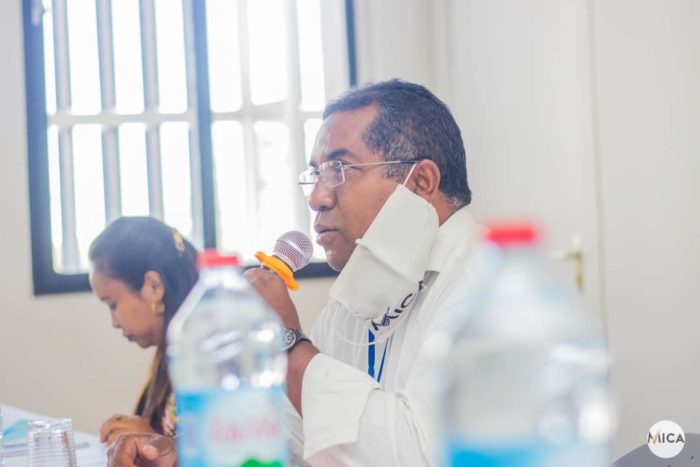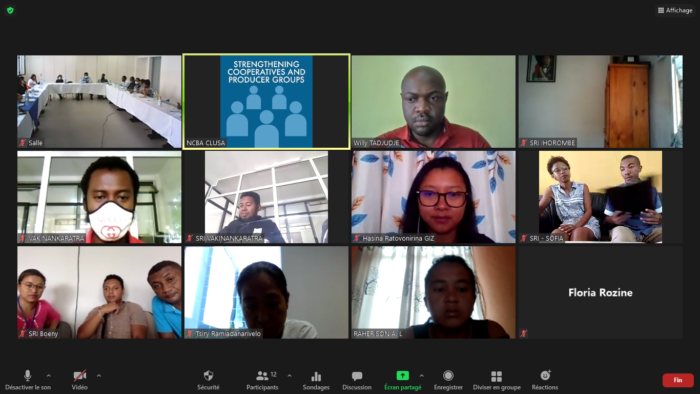
As the saying goes for some things, “it’s a marathon, not a sprint.” On the long-distance journey that often characterizes legal and regulatory reform, Madagascar’s cooperative sector continues to move forward. Through the US Agency for International Development (USAID)-funded Cooperative Development Program (CDP), NCBA CLUSA’s Creating an Environment for Cooperative Expansion (CECE) project kicked off 2021 with trainings and workshops to advance the bill for the proposed cooperative law revisions.
Co-hosted with the Ministry of Industry, Commerce and Artisanry (MICA), the initial three-day training held in January was designed as a refresher in the cooperative business model and cooperative law basics including case studies from other countries to ensure government officials had a common understanding of the specificities of cooperatives required to create enabling legislation. International cooperative law specialist Dr. Willy Tadjudje conducted the sessions from abroad given COVID travel restrictions, and government officials from multiple ministries, NCBA CLUSA staff, and staff from the Climate Change Adaptation Project (PRADA) funded by the German Society for International Cooperation (GIZ) masked up to participate in the training. As Fabrice Raharijaona, former Secretary General and current Referent of MICA explained, “we will be able to modernize and upgrade our cooperatives with reference to what is done internationally and especially in countries where cooperatives are already well developed. Thus, Madagascar will have a legal instrument that will allow us to better promote and develop cooperatives in all sectors and in all regions of the country.”
A follow-on workshop held in February sought consensus on the bill. In addition to government officials and NCBA CLUSA and PRADA staff, several cooperative leaders also participated. During the three-day workshop, Dr. Tadjudje walked participants through the bill article by article to achieve consensus. Through intense and lively debates, stakeholders came to an agreement on most articles, understanding the bill as an important vehicle for supporting the growth, professionalization, and autonomy of cooperative businesses. “I believe this law will allow innovation in the cooperative sector. But to achieve this, it should be promoted and extensively popularized with ordinary citizens, including farmers,” said Christian Andriantsaramanana, member of the Control and Supervisory Committee of the cooperative dairy union PRN.
The Government of Madagascar first approached NCBA CLUSA to support a review of the country’s national cooperative law in 2016. Initial focus groups were held in conjunction with the country’s first forum on cooperatives in 2017, and it was at this event that MICA publicly committed to revising the cooperative law as an important step in growing their nascent cooperative sector.

Under NCBA CLUSA’s previous CDP project, collaboration with MICA began in earnest and great strides were made using a multi-sectoral, inclusive, and participatory stakeholder approach. Throughout 2018, numerous stakeholder workshops and meetings were held to develop and validate a national strategy for cooperative development, conduct an analysis of the cooperative law, and provide recommendations for updating the legislation.
Presidential elections and changes in administration halted progress for a time, but champions for the cooperative sector within MICA continued to advocate for change. As stated by Irène Andriamaneho, MICA’s Director of Entrepreneurship Promotion, “cooperatives are an integral and significant part of the country’s economic landscape and participate in its development through the creation of jobs and added value. Cooperatives deserve to have a well-developed, well-studied legislative framework to enable them to develop, cope with, and adapt to market realities.”
Although there is now consensus on most articles in the draft bill, there are still sticking points to overcome related to sections on cooperative taxation, auditing, and accounting. Through the CDP, NCBA CLUSA continues to work closely with MICA and other ministries, organizing discussions to iron out these important elements of the bill and meeting with GIZ’s PRADA project to determine how the projects can collaborate to support these ongoing legislative efforts. In addition to the revised cooperative law bill, the accompanying decree, regulation, and updates to tax law will also be necessary. Thus, the marathon continues.


